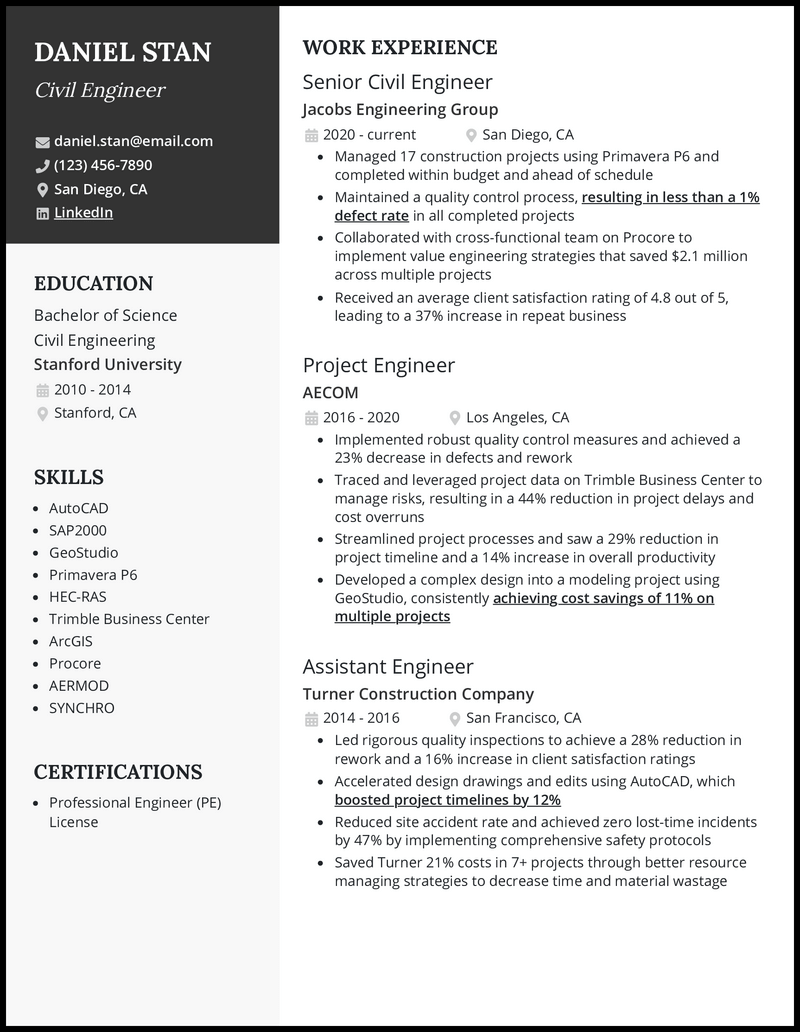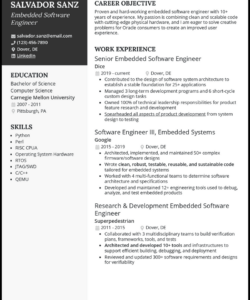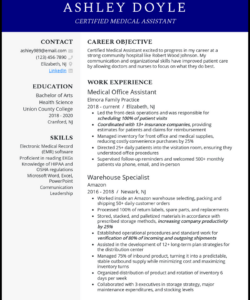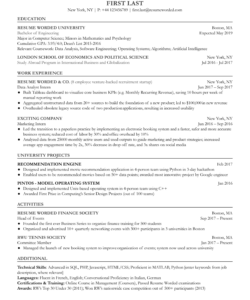Embarking on a career in civil engineering is an exciting journey, and the first major step after your studies often involves crafting a compelling resume. For a student, this can feel daunting. How do you showcase your skills, projects, and academic achievements effectively when you might have limited traditional work experience? A well-structured resume is your personal marketing tool, designed to open doors to internships, co-ops, and entry-level positions that will define your professional path.
Understanding what recruiters are looking for, even from a student with an emerging skillset, is crucial. This article aims to guide you through the process of creating a powerful document that highlights your potential and passion for the field. We’ll delve into the essential components and strategic tips that will help your application stand out from the crowd, making it easier for you to land those critical interviews.
Crafting Your Civil Engineering Student Resume: Key Sections to Include
When building your resume, think of it as a blueprint for your professional journey, just as civil engineers create blueprints for structures. Each section serves a specific purpose, contributing to the overall strength and clarity of your profile. The goal is to provide a comprehensive yet concise overview of your capabilities and aspirations, tailored specifically to the civil engineering domain. This structured approach helps busy recruiters quickly identify whether you possess the foundational knowledge and relevant attributes they seek in a promising candidate.

Contact Information and Summary/Objective
Start with your full name, phone number, professional email, and LinkedIn profile URL. Ensure these are accurate and easy to find. Directly below this, a brief Summary or Objective statement can be incredibly impactful for a student. An Objective statement clearly outlines your career goals and what you seek (e.g., “Seeking an entry-level civil engineering position to apply structural analysis skills…”). A Summary, on the other hand, highlights your top skills and experiences (e.g., “Highly motivated civil engineering student with experience in CAD software and project management…”). Choose the one that best reflects your current stage and what you want to achieve.
Education
This section is paramount for students. List your university, degree (e.g., Bachelor of Science in Civil Engineering), expected graduation date, and your GPA, especially if it’s strong (3.0 or higher). Don’t hesitate to include relevant coursework that showcases specific skills or knowledge areas, such as Structural Analysis, Geotechnical Engineering, or Fluid Mechanics. Dean’s List honors, scholarships, and academic awards are also excellent additions that highlight your academic excellence and dedication.
Experience (Projects, Internships, Work)
For civil engineering students, experience isn’t just about paid internships. It encompasses a broader range of activities. This is where you can truly differentiate yourself.
- **Academic Projects:** Detail significant projects from your coursework. Explain your role, the methodologies used, and the outcomes. For example, “Designed a sustainable water filtration system for a campus building, utilizing AutoCAD and adhering to local regulations.”
- **Internships/Co-ops:** Clearly state the company, your role, and dates. Use action verbs to describe your responsibilities and achievements, quantifying them whenever possible (e.g., “Assisted in the design of a 5-story commercial building, reducing material costs by 10% through optimized beam selection”).
- **Volunteer Work/Extracurriculars:** If you’ve been involved in Engineers Without Borders, student chapters of ASCE, or even community construction projects, highlight how these experiences developed relevant skills like teamwork, problem-solving, or leadership.
- **Relevant Work Experience:** Even if it’s not directly civil engineering-related, a part-time job that taught you transferable skills like communication, time management, or customer service is worth including.
Skills & Certifications
Create a distinct section for your technical and soft skills. Technical skills are crucial for civil engineering roles, so list specific software proficiencies (e.g., AutoCAD, Revit, SAP2000, MATLAB, ArcGIS), programming languages, and industry-specific tools. Don’t forget to include analytical and problem-solving skills. Certifications, like OSHA 10, EIT (Engineer in Training), or specific software certifications, should also be listed here as they demonstrate proactive learning and professional readiness.
Optimizing Your Civil Engineering Student Resume for Success
Once you’ve compiled all the necessary sections, the next step is to refine your resume to maximize its impact. A well-crafted civil engineering student resume template isn’t just about filling in blanks; it’s about strategically presenting your qualifications in a way that resonates with hiring managers and applicant tracking systems (ATS). This optimization process ensures your resume doesn’t just get seen, but that it truly impresses.
Always tailor your resume to each specific job application. Generic resumes rarely succeed. Read the job description carefully and identify the key skills, software, and experiences mentioned. Then, adjust your resume to reflect those keywords and requirements. For instance, if a job emphasizes structural analysis, expand on your relevant coursework or projects in that area. This targeted approach significantly increases your chances of passing initial screening filters.
Focus on accomplishments rather than just duties. Instead of saying "Responsible for drafting designs," try "Drafted designs for three residential projects, resulting in 15% faster approval times." Use strong action verbs at the beginning of your bullet points (e.g., "Designed," "Analyzed," "Managed," "Implemented," "Optimized"). Whenever possible, quantify your achievements with numbers, percentages, or specific examples, as this provides concrete evidence of your impact.
Proofreading is non-negotiable. Even a minor typo can leave a negative impression about your attention to detail, a critical skill for any engineer. Ask a friend, career advisor, or mentor to review your resume for grammar, spelling, and clarity. Additionally, ensure your formatting is clean, consistent, and easy to read. Use a professional font and maintain adequate white space. A visually appealing and error-free document reflects professionalism and care.
Creating an effective resume as a civil engineering student might seem like a complex task, but by utilizing a structured approach and focusing on your unique strengths, you can develop a document that effectively communicates your potential. Remember, your resume is often the first impression you make on a potential employer, so make it count.
Take the time to refine each section, highlight your most relevant experiences, and present your skills clearly and concisely. With a well-thought-out and polished resume, you’ll be well on your way to securing the opportunities that will launch your exciting career in civil engineering. Your future begins with this crucial step.


